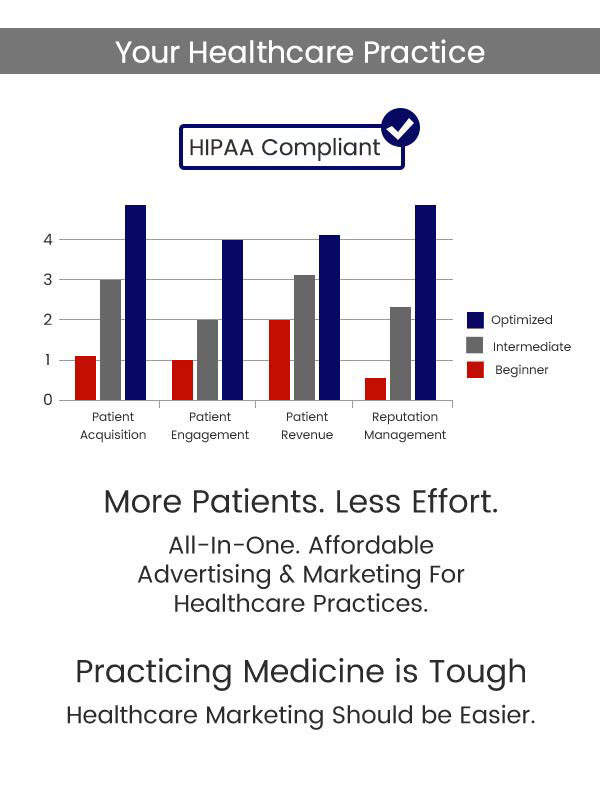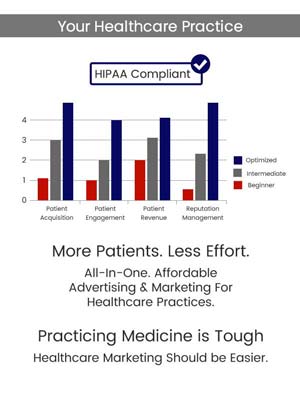SEO for Dental Practices & Examples of Dental SEO
Dental SEO 4 Good Examples of Dental SEO, Speech Based SEO and Technical SEO for Dental Websites. Costs $799/mon to $1399/mon
Owning a dental practice means having a website to promote the services being offered there. A dental practice’s website is generally the lynchpin of an entire medical marketing plan for a dental practice. Among the many different online marketing strategies a practice will use to acquire new patients, search engine optimization or SEO will be the most impactful. Below are some typical questions the dental practice owner will ask about SEO and how it affects their dental practice. Many dental practices also hire a dental marketing expert or a dental SEO specialist to manage their advertising and marketing.
PatientGain.com has created several products and offerings to help you achieve great dental SEO – Search Engine Optimization for your dental practice. Medical SEO and Dental SEO are very similar. Key difference is the domain knowledge of the dental procedures and how potential dental patients convert to paying dental patients for your dental practice.
Focus is on results which means new patients, this means top Google rankings, with significant focus on mobile search results and mobile marketing. Google search engine is the most accurate search engine with the best algorithms for search results. Majority of the world searches on Google. According to Google, over 200 “signals” are used to rank medical websites. The most important factor is your own content. So for medical SEO for doctors, you must focus on Google first, and start with adding Unique, High Quality Content – This means Non-Copied, Non-Plagiarized Content.
For example if your dental practice offers Invisalign, your website should have at least 1 page dedicated to this dental service. The page should have a headings, paragraph text, at least one image and useful information for the reader. Here is good example of how a page on Invisalign can help your dental SEO.
Dental SEO Success Requires Proficiency in Four Important Areas:
1) Dental Procedures Knowledge and Content Writing Skills
2) Expertise in Search Engine Algorithms, Digital Best Practices, and Patient Behavior
3) A Dynamic Software Platform Designed to Adapt to Changes with Trends and Technology
4) World Class Support behind Your Technology System
Achieving top dental SEO rankings for dental practices and dentists is a process and not a simple one-time setup. It is time-intensive, requires deep knowledge about your own medical practice and Search Engine technology, costs both money and time to get real results, and it never stops for your medical practice.
Table of Contents:
Question 1: Does the content of my dental website impact the dental SEO?
Question 2: Does SEO impact my dental clinic’s patient count?
Question 3: Does my dental website speed impact my SEO rankings?
Question 4: I want to remove specific text from my website. Will this impact my dental SEO?
Question 5: My website is too wordy. Why do I need so much content?
Question 6: If I have keywords in my domain name, will I get higher dental SEO?
Question 7: Is SEO good for new patient marketing?
Question 8: If I spend a lot of money on Google ads, will my SEO improve?
Question 9: For best dental SEO results, do I need to add a lot of content at once?
Question 10: What is technical dental SEO?
Question 11: Will videos increase SEO for a dental practice’s website?
Question 12: I have read on Facebook social media posts that too much content on my healthcare website would be “Spamming” the search engines. Is this correct?
Question 13: Is dental SEO some type of “sinister magic,” or is there a secret?
Question 14: Is voice search important?
Question 15: Should I focus on the SEO work be on the 1) dental practice or 2) the dentist?
Question 16: If I have a lot of images on my web pages, will my SEO increase?
Question 17: I have been approached by “content writing” companies who claim that adding content will improve my dental SEO. Is this correct?
Question 18: I have heard that Google is now “looking” at your website for page experience. What does this mean?
Question 19: If I add Google posts every week? Will Google Posts increase my local SEO?
Question 20: My new dental website just went live, and I searched for my clinic name, but I am nowhere to be found. What is wrong?
Question 21: How does dental SEO work?
Question 22: Are Dental SEO and Dental SEM (Search Engine Marketing) the same?
Question 23: If a dentist has outstanding SEO rankings, should they continue to fund an online advertising campaign? Should they still use things like Google PPC ads or Facebook/Instagram ads?
Question 24: If a dental practice has a very nice-looking website, do they need to do “dental SEO” every month?
Question 25: How long does it take for dental SEO to work?
4 Good examples of dental SEO for dental offices
Dental SEO Example 1: Patient searching for a a family dentist. Patient located in Toledo Ohio
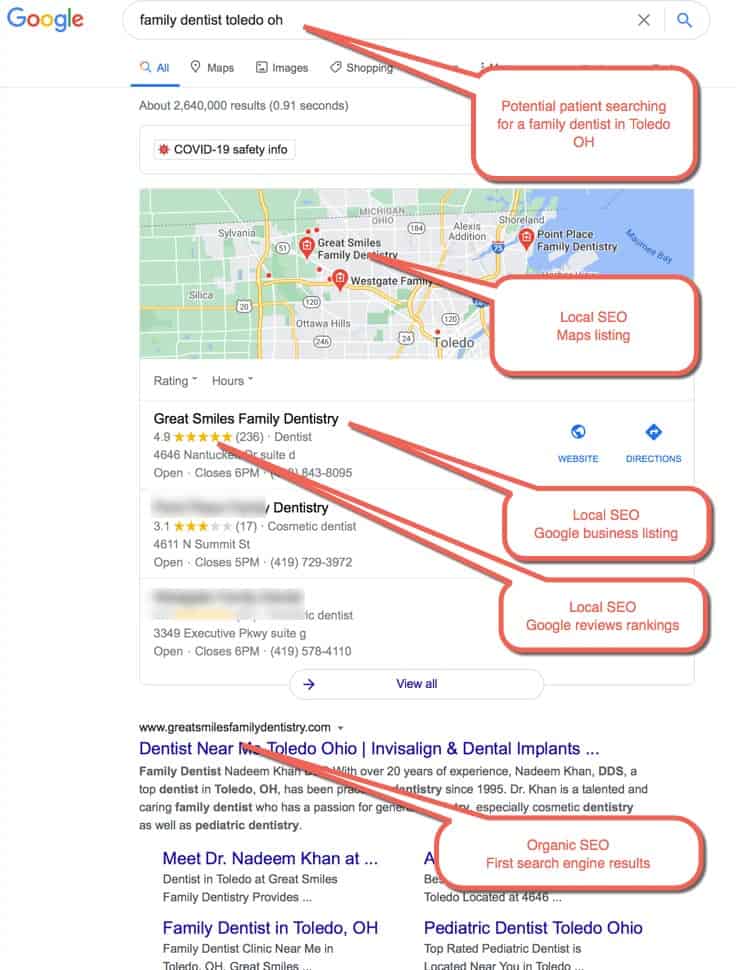
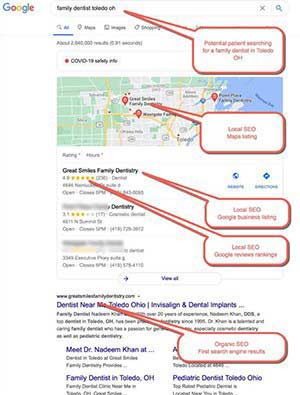
Dental SEO Example 2: Patient searching for an Invisalign dentist. Patient located in Toledo Ohio
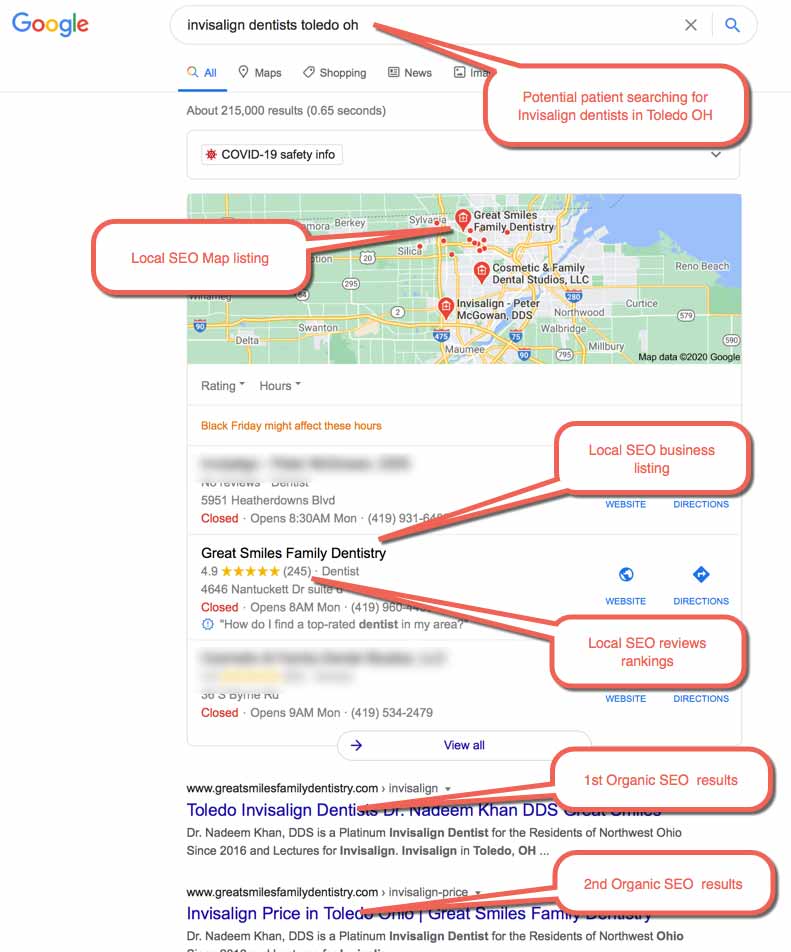
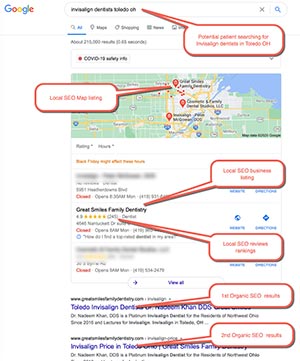
Dental SEO Example 3: Patient searching for TMJ dentist and clinic for jaw pain treatment. Patient located in Kansas City MO
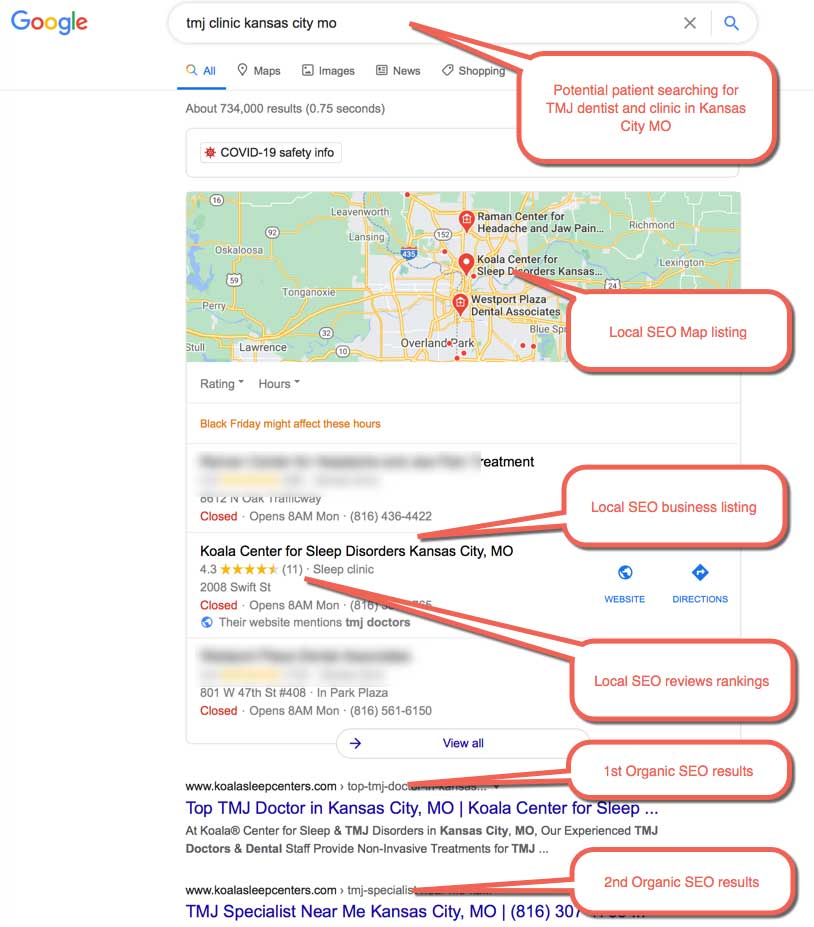
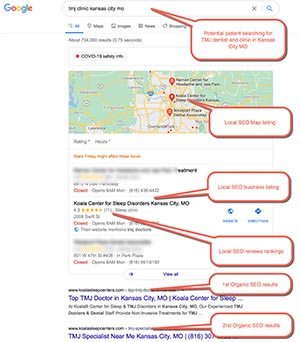
Dental SEO Example 4: Patient searching for Invisalign cost. Patient located in Toledo Ohio
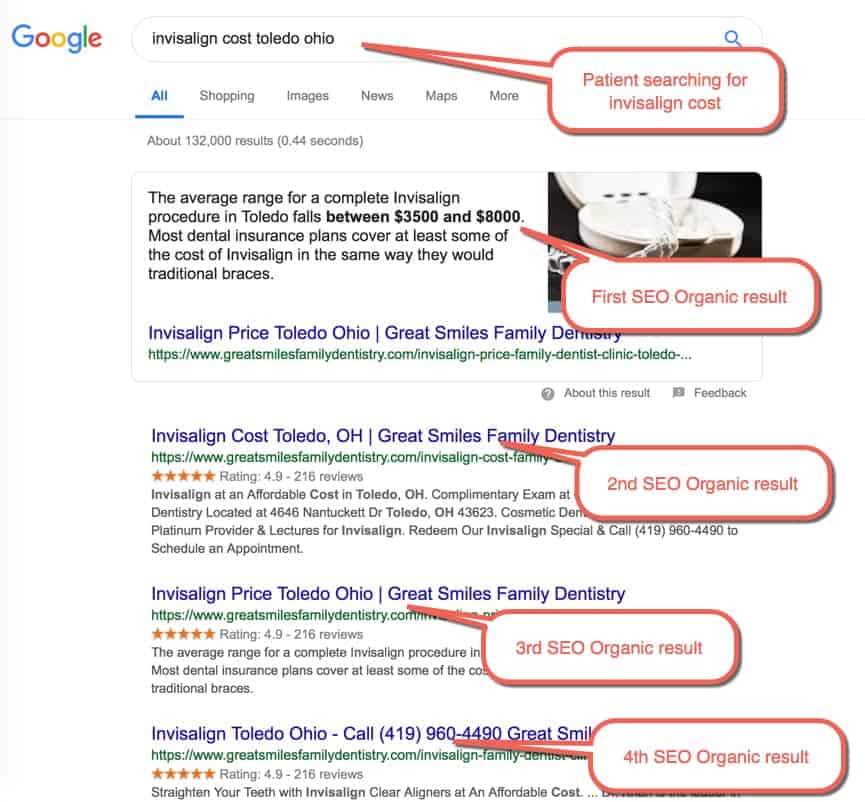
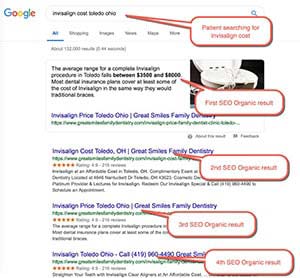
25 Good dental SEO marketing questions asked by dentists and practice managers:
Question 1: Does the content of my dental website impact the dental SEO?
Answer: Your content is the single most important factor in your online effectiveness and dental SEO.
- Useful dental content defines your brand.
- Content expresses who you are, how you conduct your dental business.
- Authoritative dental content is read by the Search Engines – and this results in GOOD or POOR rankings – You should NEVER copy content from another site. Checking ideas from other websites is OK, but copying content is like shooting yourself in the foot.
- Authoritative dental content can make your marketing flourish.
- Authoritative dental content can make your advertising irresistible.
- Social media loves GOOD authoritative dental content.
- Email marketing with good quality content will give you higher open-rates.
- Best of all – Patients LOVE useful content.
Question 2: Does SEO impact my dental clinic’s patient count?
Yes, your SEO rankings can either help your dental practice or hurt your online presence. To maintain and grow a successful dental practice, a business must constantly be looking for new patients. If patients are unaware of the services or the name of a practice, they will use a search engine to find their oral health solutions. Good dental SEO results on Google will cause a dental practice to appear in those top organic rankings. The more often a dental practice’s website appears in search results, the more likely potent patients visit it. Assuming a website is optimized for conversion, then the patient count will begin to grow with excellent SEO work!
Question 3: Does my dental website speed impact my SEO rankings?
A search engine’s overriding goal is to provide an excellent experience for its users. Those searching online obviously want relevant results presented to them in their organic results. However, the search engine experience does not just end at organic results. A person’s exploration of those results also impacts SEO rankings. Much like waiting in line for a rollercoaster or ice cream, people want things as soon as possible, including their websites loading quickly. If a website takes too long to load, visitors will go back to the results and explore another site. This return to results will tell a search engine that a website is not as relevant as it thought.
Dental Practice websites need to be optimized for speed on any device it is viewed on, be it a desktop computer or a mobile phone. Search engines constantly test the load speed of websites. Those results will impact their organic results, especially on mobile. The most common things that will slow down a site’s loading speed are:
- Unoptimized pictures.
- Videos loading directly to the site.
- Technical coding that breaks down or interferes with other parts of a website.
Dental website speed should be monitored and checked at least once a month to ensure things are running smoothly.
This new algorithm was launched sometime in mid 2021. Google’s page experience algorithm is designed to reward you for fast loading mobile websites. You can check the performance of your website, or any page at https://web.dev/measure/. It covers 4 major areas:
1) performance
2) accessibility
3) best practices
4) SEO.
So as a best practice, your strategy should be to be “green” in all of these areas. When you run tests on https://web.dev/measure/ , enter your website URL, and run it 4-6 times. Then take an average. Remember that this is a tool provided by Google, as a simulator that is close to what Google’s actual search algorithms’ see. So our view is that it is a very good way of evaluating a website. Here is the data from PatientGain’s website and another company’s website :
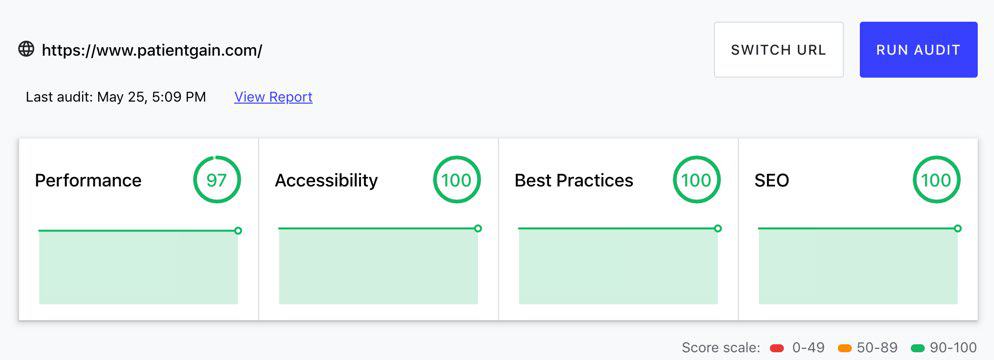

Question 4: I want to remove specific text from my website. Will this impact my dental SEO?
The short answer is, more than likely, yes. However, the removal of content does not necessarily mean that it will negatively impact SEO rankings. Making content more unique, relevant, informative, and engaging does sometimes require removing content from pages. Some common reasons to remove content from a site page include:
- A repetitive passage that is addressed elsewhere on the page
- Content that is no longer up to date or accurate
- A service that is no longer being offered by a dental practice
- A content page that has become so large that it is better to remove some content and place it on a new page
- Spelling or grammar mistakes that require correction so that ideas and concepts flow better.
Question 5: My website is too wordy. Why do I need so much content?
Although there are reasons to remove content, as mentioned above, a terrible reason to remove content is the belief that a page is too “wordy.” When it comes to content on a website, “Content is King.” Search engines like to see some more useful content,” as it were, and the more content a dental practice has, the more authoritative it will appear. Cutting content to make a site shorter will have the opposite impact. A search engine also tracks how long users spend on a website. A potential patient will spend more time reading a page with 600 words than they are a page with 100 words.
With that said, content does need to be relevant, well written and focused on providing value to the reader. It is adding “fluff” to content just to make it longer will not improve organic rankings. However, there is something to having entirely too much content on a page. For example, suppose a dental practice started only offering a few services and had one page describing them. In that case, it may find itself, years later, that after it added additional services, the page now has entirely too much content. This page, currently listing and describing every service available, is unfocused and probably not as organized as possible. It is good to cut content but then place it on its page to gain SEO value in this situation.
Question 6: If I have keywords in my domain name, will I get higher dental SEO?
The domain name of a dental practice plays a role in building your brand, however it does not and impacts SEO. Incorporating important content into the website is more important than just having a name like “best-dentist-in-toldeo-ohio”. URL must also not be tremendously long from a marketing standpoint. Something like Bestdentalpracticeinstatecollegeandcentralpaforkids.com is going to look strange on a business card and a bit suspicious. On the other side, Bluehorizon.com will not help with dental branding, because there is nothing in the URL that indicates it is a dental practice. Include one or two essential keywords in an URL to help boost your brand. Include a word about the services you offer, like a dentist or, if it is a specialized practice, the service, like root canals. Also, consider adding the name of the area a dental practice is located. BlueHorizonDentistry.com or LancasterRootCanalSpecialists.com will do well for branding.
Question 7: Is SEO good for new patient marketing?
Yes, SEO is great for new patient marketing. Patients who have never visited your dental practice before are unlikely to know the name, which likely has excellent SEO rankings. These patients are more likely to search for symptoms or the services they need in search engines. Good SEO work will ensure that the keywords they search for are the exact keywords spread throughout website content. This, in turn, should boost the SEO Ranking of a website and present it as a relevant choice to search engine users.
Question 8: If I spend a lot of money on Google ads, will my SEO improve?
The quick answer to this question is no. Google makes it clear that a website can not buy their way to the top of organic results regardless of what industry they are in. One can buy their way into ad results, but they have no meaningful impact on SEO rankings. However, Google Ads can fill the gap of getting patients to a website when a dental practice is first building SEO ranking. Gaining organic ranking does not generally happen overnight and is a process. This wait occurs when new sites launch or when new services are being offered. Search ads with Google can help drive people to that website and convert them into patients. Also, good SEO work will be enhanced as the page or site gets more visitors, and more people spend time on the site.
Question 9: For best dental SEO results, do I need to add a lot of content at once?
Quite the opposite! When making SEO improvements to a dental practice’s website, posting new content all at once will not only have a more negligible impact on overall rankings, it can hurt it. When a search engine reviews a website, it only looks at the content on the website. It will not call a dental practice owner or a website designer and ask what improvements were made or why. If a dental practice updates all of its content at once, the next time a search engine exams the site, it will look like a completely new site to it. As it tries to digest this new content and judge how relevant it is to various keywords, the organic ranking of a dental practice may end up falling instead of rising.
Another thing that search engines like to see is a website that is up to date. While updating everything will meet this requirement, the longer a website goes without an update, this critical aspect will have less impact. To maintain good SEO, a site needs to be updated regularly. Updating it once a year or every two years is not going to help boost its SEO. Instead, a site should be gradually and continually updated throughout the year. Pages should be updated one at a time with some space between updates. For a search engine, they will see a mostly similar site but with parts being updated throughout the year. This gradual, continual effort will do much more to boost SEO than an all at once update.
Question 10: What is technical dental SEO?
Technical Dental SEO is a part of the broader concept of search engine optimization, but it works behind the scenes with the infrastructure of a website. In most cases, a website user will not see much difference when technical SEO is improved, but their experience will be better. First, the organization of website pages on a dental practice, and their navigation path are all parts of technical SEO. So is how the navigation bar is organized and displayed online. HTML tags, which visitors do not see but help search engines understand the context of pages, are also a big part of technical SEO. You may have heard of some of these tags before, such as H1, H2, Alt-Text, Meta, Header, and Footer. These tags are invisible when viewed on a browser but can help a search engine know the relevant pages. Another aspect of technical SEO that has already been discussed here: Site speed. Many improvements to site speed are usually made in the area of technical SEO.
Question 11: Will videos increase SEO for a dental practice’s website?
Yes, videos may increase the SEO value for dental practices. Adding a video without proper tags, titles, and video description will not increase SEO. The reason is that still cannot “read” entire video content. But this will change due to AI. So helpful content is required for SEO. If a video is followed by comments from the audience, Google’s search algorithm’s read the comments, and this further helps in the SEO.
Videos are a great way to engage patients online and often lead to greater conversions. Also, when viewing a video on a website, this will increase the amount of time a website visitor spends on a site, leading to higher engagement. Videos, if used correctly, can be a benefit to organic dental SEO rankings.
However, a few things to keep in mind when using videos on a dental practice’s website. First, videos do not replace text. Videos are meant to augment the content that is on the page. Search engines can read text, and they can not watch videos. As such, videos should be tagged with “Alt-Text” to describe the topic of the video for a search engines. Videos should also be short and not feature-length films. They should be concise, convey the ideas of a specific topic, and finish so that a user can explore more of the site. Finally, as mentioned above, videos should not load directly to the site and instead be embedded into it from a third-party video hosting site. YouTube makes embedding videos very easy, and if a video is well-produced, it may start getting its SEO rankings as well in search results.
Question 12: I have read on Facebook social media posts that too much content on my healthcare website would be “Spamming” the search engines. Is this correct?
As valuable as social media is at spreading information and connecting with current and potential patients, it is not always the best source for information. Having too much content is not exactly “spamming” a search engine and hurting SEO rankings. Generally, the more content a dental practice has usually will be positive for organic rankings. Having too much content on a page may cause people to click on the back button and looking for a page with more digestible content. Going back to search results after spending so little time on a page because too much content can hurt SEO Rankings. Content that just repeats itself over and over again can also hurt SEO rankings.
With that said, there is something called “Keyword Stuffing,” which is spamming a search engine and can hurt overall SEO Rankings. Keyword stuff is when a practice tries to use its SEO keywords a much as possible in every bit of content it can. While this worked when search engines were brand new, they are smart enough now to pick up on this tactic. If a website is a cake, SEO keywords should be the sprinkles and icing on that cake. Too much of it will spoil the desired result.
Question 13: Is dental SEO some type of “sinister magic,” or is there a secret?
Anything may seem like magic if you do not understand the concepts that make it work. Imagine explaining television to George Washington. To him, it would certainly seem like magic. Dental SEO is not magic, and it is not all that much of a secret if you understand how it works. However, understanding how something works does not mean you are instantly proficient with it, which is why website design and management companies help dental practices. Ultimately, the “secret” to dental SEO is that it is never a one-and-done proposition. It must be managed, updated, monitored, and changes are always happening to keep organic rankings as high as possible.
Question 14: Is voice search important?
Voice search is important because it is the next frontier of overall search engine marketing. This area of search is growing as people use voice search more with their smart speakers, digital personal assistants, and other devices they speak to get answers to questions. Voice search is still very new, but it continues to grow and be refined by search engines to give people the best results possible.
A way dental practices are approaching voice search is by concentrating on their long-tail keywords. Long-tail keywords are four words or more, focusing on a narrow topic, getting low web traffic, and having high conversion rates. Their cousins, short-tail keywords, are three words or less, have lower conversations, cover broad topics, and tend to get more traffic. Voice search queries are usually complete sentences, which lend themselves to long-tail keywords. For example, someone is likely to a smart speaker or a digital personal assistant, “Where is there a dentist in Easton, PA” rather than “Easton PA Dentist.” If a dental practice can match that long-tail keyword, word for word, on their site, they stand a pretty good chance at ranking high in organic results.
Question 15: Should I focus on the SEO work be on the 1) dental practice or 2) the dentist?
Generally you want to focus on services offered by your dental practice. Services is patients are looking for. For example “dentist near me” and “dentist near me” followed by a city name is extremely important. But so is “dental implants near me”. Just imagine which of these searches has a higher conversion rate? It is the 2nd one. So your strategy should always to focus on results or conversions.
Deciding between a practice or a dentist for the focus of the SEO work can also be based on the desired business objectives of the dental practice. It all depends on how a dental practice is set up. If a practice has many different dentists that get hired for a few years before they move on and open their practices, focusing on the dental practice is generally the way to go. If a dentist owns their practice and only has a few other providers working for them, focusing on them for SEO is generally the go-to preference. Focusing on a dentist for SEO is especially appealing if the dentist is trying to brand himself and be the “face” of the practice.
In some situations, you can focus on both! A dental practice that has no one lead dentists but instead many dentists committed to the business long term could have SEO concentrate on them and the practice. Dentists tend to develop an excellent loyal patient base, primarily if they work in one area for a long time. Working on that SEO for them and the practice will help potential patients looking for a dentist and likely patients who have heard from friends and family about how great a dentist is!
Question 16: If I have a lot of images on my web pages, will my SEO increase?
Much like videos, images are very engaging for a website visitor to look at and learn information. They will catch a potential patient’s attention and entice them to explore a website further. However, pictures are not a replacement for well written content. Search engines can not “read” or “see” pictures much like they can not “watch” videos. Pictures need to have “alt-text” tags attached to them, so search engines have an idea of the context of a picture. Good use of images will keep a visitor engaged and on a site longer, which will boost conversions.
Pictures can also negatively impact SEO rankings if they are not optimized for the web or mobile. Large images can cause slow load speeds, which will hurt overall organic rankings. Many unoptimized pictures all trying to load at once will grind a website to a halt, making it unusable and looking very amateurish.
Question 17: I have been approached by “content writing” companies who claim that adding content will improve my dental SEO. Is this correct?
As a general rule, the more content a website has the better organic rankings will be over time. However, this content needs to be unique, relevant, authoritative, helpful, and informative. Adding words just to add words to a page will have little if any impact on an overall SEO ranking. Effective content writing should also include the target SEO keywords throughout the writing to boost organic rankings. To use an analogy, yes, tires help a car go forward, but if the tires are of poor quality or are not properly inflated, that car will not get very far. The same concept should be applied to content writing if a dental practice wants to improve its dental SEO.
Question 18: I have heard that Google is now “looking” at your website for page experience. What does this mean?
Google sends out web crawlers to explore websites to check for new content and current content, so it improves their search results. Crawlers are now looking at other things to gauge the page experience (sometimes called user experience) when people visit the website. The page experience for a dental practice’s website goes beyond what is written on it. Search engines look at how a website is structured, a navigation menu, internal linking, site load speed, and several other things. These aspects of the website do not necessarily make it more authoritative or relevant, but it does impact the experience. This can play a significant role in organic results if two websites already have well-written content for SEO rankings. The dental practice whose website loads quickly, is organized, and provides easy navigation will rank higher than a disorganized website. Technical SEO work often addresses these issues.
Question 19: If I add Google posts every week? Will Google Posts increase my local SEO?
Google posts, made through a Google My Business Profile, do impact overall local SEO. Google posts are a great way to share content and call to actions for people looking for an oral health solution. Unlike other social media posts, Google posts show up directly in search results in the knowledge panel highlighting a business. Dental practices wanting to improve their Local SEO will need to have a Google My Business Profile to appear in local results and on Google Maps. Posts made to their Google My Business profile will be seen in search results and encourage people to visit their site. The more visits to a dental practice’s website from search results it receives from search results, the more important and relevant a search engine will perceive the site. Google posts can only help increase those conversion rates.
In addition, local SEO for your dental website depends on other important websites. You need to create business listings on several essential websites with direct links back to your site. The most important directories to create a business listing on are:
- Google – Add your clinic listing on Google my business
- Bing – Add your clinic listing on Bing places
- Yelp – Add your clinic listing on Yelp
- Facebook – Add your clinic listing on Facebook
- Foursquare – Add your clinic listing on Foursquare
- Apple Maps – Add your clinic listing on Apple Maps
Question 20: My new dental website just went live, and I searched for my clinic name, but I am nowhere to be found. What is wrong?
First and foremost, do not panic. Search engines are not like electronic signs where you flip a switch, and suddenly it is there for all to see. It takes time for search engines to find a website, crawl it, and figure out what topics and searches to include for results. SEO rankings and organic results take time. The clinic’s name is usually the first thing to start to gain organic rankings, as it should be unique to the area. To help speed up this process, be sure to submit the URL to Google to make it aware that it should be crawled, create a Google My Business profile, and share the links to friends and family to explore. The more visits it gets when it first launches, the more likely it will start picking up some SEO value quickly.
Question 21: How does dental SEO work?
Dental SEO is the process of helping search engines understand the nature and context of a dental practice and when to present it to users in search results. Generally, this is accomplished by inserting SEO keywords throughout the content. These keywords should be the top keywords potential patients use when seeking out dental services. Keywords should include short-tail keywords and long-tail keywords. Examples of these two types of keywords are:
Short Tail Keywords
- Three words or less
- Cover broad topics
- High web traffic
- Low conversion rates
- Very competitive
Long-Tail Keywords
- Four words or more
- Covers narrow or unique topics
- Low web traffic
- High conversion rates
- Less competitive
- Playing an increased role in Voice Search
Question 22: Are Dental SEO and Dental SEM (Search Engine Marketing) the same?
Although Dental SEO and Dental SEM are sometimes used interchangeably, they are not the same thing. As mentioned in various parts above, dental SEO involves improving content to increase the organic ranking of a site in organic search results. Dental SEM consists of the use of paid ads to promote a website in search results. You would use Google AdWords to promote a dental website using Search Engine Marketing. At the same time, you would rewrite and insert keywords into content to promote a website using Search Engine Optimization. Strong SEO and SEM marketing campaigns working together can play a significant role in increasing patient count.
Question 23: If a dentist has outstanding SEO rankings, should they continue to fund an online advertising campaign? Should they still use things like Google PPC ads or Facebook/Instagram ads?
In short, yes, they should continue paid advertising campaigns across multiple channels if their marketing budget allows for it. That budget may be adjusted to spend less so that other marketing campaigns, like direct mail marketing, can be used, but a dental practice should avoid abandoning online advertising altogether. If a dentist ends all online advertising, this provides an opening for competitors to run their ads at reduced costs. They could if the ad is designed well, start to siphon off potential patients to their practice. Also, when searching for dental practices online, having a practice appear in paid results, map results, and organic results is a robust case for a potential patient to explore that dental practice.
Question 24: If a dental practice has a very nice-looking website, do they need to do “dental SEO” every month?
Absolutely! A nice-looking website is not going to perform well if SEO is not managed and maintained every month. If you owned very expensive car and just washed and waxed it every month to look nice but never took it to a mechanic to be serviced, how long do you think it would last? SEO is not a static entity and is changing all the time. Keywords that were popular last month may be replaced by new keywords this month. Site speed may have dropped significantly throughout the last few weeks and needs to be addressed. Content may need to be adjusted due to new local or national health needs. With just these few of many reasons why SEO could be impacted, it needs to be addressed continuously throughout the year. It is not something that needs to be looked at every day, but a monthly evaluation and adjustments can only benefit a dental practice.
Question 25: How long does it take for dental SEO to work?
How long Dental SEO takes to work depends on many factors, but a practice should start to see results after about 4 months or longer. It takes time to build organic rankings, and it is doubtful things will change overnight unless competitors suddenly go out of business and take their website down.
General Answer: 4 Months to 1 Year (according to Google)
(for a brand new medical website)
If you already have a website, let’s say you have a family dental practice for 10 years. You have had a website, with minimum information and the SEO and other performance like conversions are in a bad shape, and if you decide to use PatientGain’s GOLD or PLATINUM service, then within 1 months to 2 months, you will start seeing improvements, however you should not expect to be on “top of page 1” immediately.
The true benefit of SEO is long term. According to Google SEO staff, medical marketing companies and agencies should set proper expectations for healthcare customers.
It takes 4 months to 1 year to start seeing benefits of medical SEO and improvements in rankings. Watch this video from Google.
The timeline can be longer if a competitor is making their SEO improvements to counter your work or they operate in highly competitive area for a dental practice. Despite the time it takes to improve overall SEO, it is well worth the time and effort. It is widely regarded as the most cost-effective dental marketing strategy practices can use to increase the patient count and grow.
Additional related topics to dental SEO:
Digital Marketing For Dentists & Dental Practices
Dental Marketing Pricing ($199/mon to $1399/mon)
Dental Website Design Cost
What Is Dental SEO, and Does It Work?
How Voice Search Impacts Your Dental SEO
Dental Marketing ROI Calculator Used By Top Dental Practices
Dental Practice Advertising
SEO for Dentists: How to Reach More Patients Online
Dental SEO Keywords
What Is Dental Marketing? How Dental Marketing Works?
What Makes a Dental Marketing Company Helpful to Your Dental Practice?
Here is an example of a very effective dental SEO.
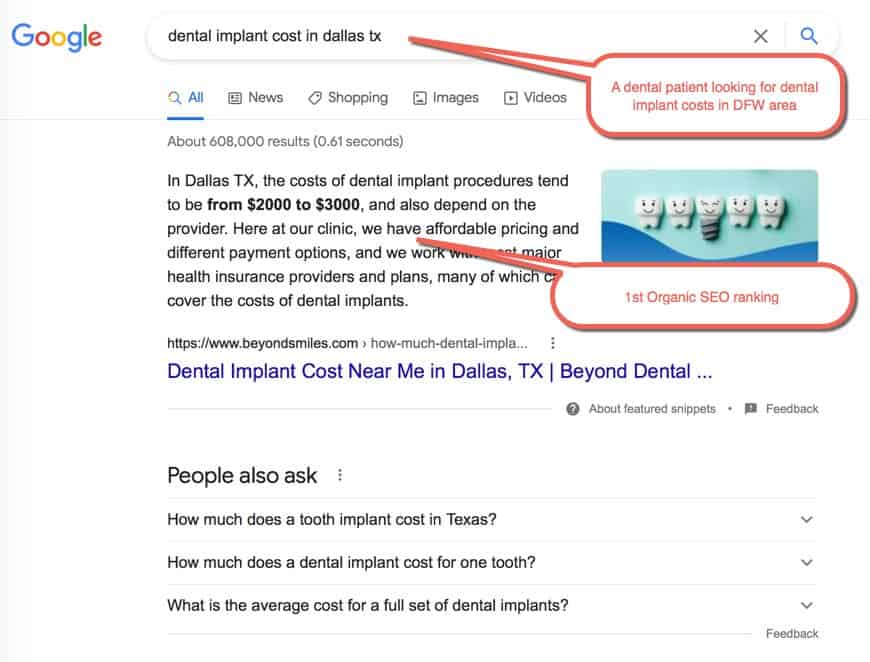
The experts at PatientGain.com can help a dental practice grown its business by improving its SEO. Contact our experienced team today, and let us show you what we can do for your business. We have assisted many dental practices across the country and look forward to working with you!
